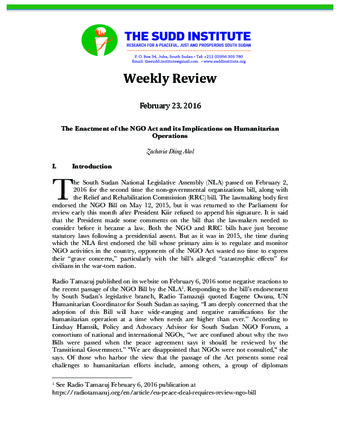South Sudan’s Enactment of NGO Act and its Implications on Humanitarian Operations

Organization: The Sudd Institute
Type: Weekly Reviews
Date: 23/02/2016
Publication Summary
The South Sudan National Legislative Assembly (NLA) passed on February 2, 2016 for the second time the non-governmental organizations bill, along with the Relief and Rehabilitation Commission (RRC) bill. The lawmaking body first endorsed the NGO Bill on May 12, 2015, but it was returned to the Parliament for review early this month after President Kiir refused to append his signature. It is said that the President made some comments on the bill that the lawmakers needed to consider before it became a law. Both the NGO and RRC bills have just become statutory laws following a presidential assent. But as it was in 2015, the time during which the NLA first endorsed the bill whose primary aim is to regulate and monitor NGO activities in the country, opponents of the NGO Act wasted no time to express their “grave concerns,” particularly with the bill’s alleged “catastrophic effects” for civilians in the war-torn nation.
Radio Tamazuj published on its website on February 6, 2016 some negative reactions to the recent passage of the NGO Bill by the NLA[1]. Responding to the bill’s endorsement by South Sudan’s legislative branch, Radio Tamazuji quoted Eugene Owusu, UN Humanitarian Coordinator for South Sudan as saying, “I am deeply concerned that the adoption of this Bill will have wide-ranging and negative ramifications for the humanitarian operation at a time when needs are higher than ever.” According to Lindsay Hamsik, Policy and Advocacy Advisor for South Sudan NGO Forum, a consortium of national and international NGOs, “we are confused about why the two Bills were passed when the peace agreement says it should be reviewed by the Transitional Government.” "We are disappointed that NGOs were not consulted," she says. Of those who harbor the view that the passage of the Act presents some real challenges to humanitarian efforts include, among others, a group of diplomats accredited to the Republic of South Sudan, international non-governmental organizations, some South Sudanese politicians and representatives of the civil society and non-governmental organizations.
This weekly review attempts to explore the content of the NGO Act, particularly a number of provisions, which the opponents of this legislative measure claim, albeit indirectly, present imminent, serious impacts, on humanitarian operations in South Sudan. Equally, the undertone, which the reactions carry that the Act does not seem to have been well intended at all, is examined. Moreover, the context in which the statutory act of parliament emerged, as this might explain the seemingly emotive reactions, which ostensibly have extra bases outside the content of the recent enacted law, is highlighted. Lastly, the paper examines the context of this Act in light of similar regulatory frameworks in the region.
